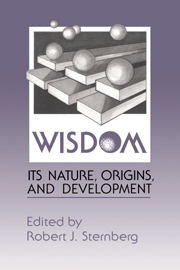Book contents
- Frontmatter
- Contents
- List of contributors
- Preface
- Part I Approaches to the study of wisdom
- Part II Approaches informed by philosophical conceptions of wisdom
- Part III Approaches informed by folk conceptions of wisdom
- 5 Toward a psychology of wisdom and its ontogenesis
- 6 Wisdom in a postapocalyptic age
- 7 Wisdom and its relations to intelligence and creativity
- 8 The study of wise persons: integrating a personality perspective
- Part IV Approaches informed by psychodevelopmental conceptions of wisdom
- Part V Integration of approaches and viewpoints
- Name index
- Subject index
6 - Wisdom in a postapocalyptic age
Published online by Cambridge University Press: 05 June 2012
- Frontmatter
- Contents
- List of contributors
- Preface
- Part I Approaches to the study of wisdom
- Part II Approaches informed by philosophical conceptions of wisdom
- Part III Approaches informed by folk conceptions of wisdom
- 5 Toward a psychology of wisdom and its ontogenesis
- 6 Wisdom in a postapocalyptic age
- 7 Wisdom and its relations to intelligence and creativity
- 8 The study of wise persons: integrating a personality perspective
- Part IV Approaches informed by psychodevelopmental conceptions of wisdom
- Part V Integration of approaches and viewpoints
- Name index
- Subject index
Summary
A disquieting suggestion
Alasdar Macintyre begins his provocative book After Virtue (1981) with what he refers to as “a disquieting suggestion.” He asks us to imagine that in some previous time, now lost to memory, the natural sciences suffered a monumental catastrophe, perhaps at the hands of some know-nothing political movement, in which laboratories were burned down, books and instruments destroyed, and scientific teaching abolished. Much later, according to this fictional account, other more enlightened people undertake the task of rebuilding science, although they have largely forgotten what it was. In doing so, they salvage the charred remains of half-chapters from books, single pages from articles, and instruments whose use they no longer understand. Out of this patchwork of unrelated fragments they struggle to reembody what was once physics and chemistry and biology. Like a cargo cult filled with persons with names like “handle with care” or “this side up,” the would-be scientists of this scavenger society learn various incantations about “neutrinos” and “atomic weights,” but nobody, or almost nobody, has any grounds for even suspecting that such sloganeering does not sum to the actual doing of natural science in any proper sense at all. That is, the fragmented thinking of the persons living in such a disordered culture would need to be numbered among the symptoms of the disaster whose consequences they were trying to overcome, and as a result, the magnitude and perhaps even the very occurrence of the catastrophe they had suffered would inevitably prove invisible to them.
- Type
- Chapter
- Information
- WisdomIts Nature, Origins, and Development, pp. 121 - 141Publisher: Cambridge University PressPrint publication year: 1990
- 37
- Cited by

